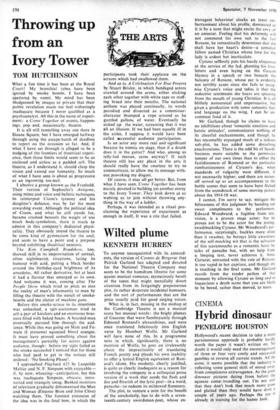Wilted plume
KENNETH HURREN
To anyone unacquainted with its anteced- ents, the version of Cyrano de Bergerac that Patrick Garland has adapted and directed for the National Theatre Company may seem to be the humdrum libretto for some quaint musical romance, mysteriously bereft of the tunes that might mercifully divert attention from its fatiguingly preposterous plot, its rather desperate incidental humours, and the sort of performances that are the price usually paid for good singing voices.
What is, in fact, missing in the mishap at the Cambridge Theatre is not a musical score but musical words: the bright plumes of Gascony that wave flamboyantly through Edmond R,ostand's alexandrines, and were once translated felicitously into English verse by Humbert Wolfe. Mr Garland will have none of this. In a programme note in which, significantly, there is no mention of Wolfe, he goes on irrelevantly about the impracticality of translating French poetry and pleads his own inability to offer a lyrical English equivalent of Rost- and's idiom. His modesty, clearly justified, is quite as clearly inadequate as a reason for involving the company in a colloquial prose version of a work that needs the flash and fire and flourish of the lyric poet—in a word, panache—to redeem its mildewed flummery.
The plot, to venture a note for the benefit of the unscholarly, has to do with a seven- teenth-century swordsman-poet, whose ex- travagant behaviour cloaks an inner em- barrassment about his profile, dominated as it is by a nose that might excite the envy of an anteater. Feeling that his deformity will not commend his own suit to the fair Roxane, he romantically determines that she shall have her heart's desire—a comelier fellow named Christian whose love for the lady is ardent but inarticulate.
Cyrano selflessly puts his heady eloquence at the service of the lad, ghosting his love. letters and even laying on the Gascon blarney in a speech or two beneath the balcony of Roxane, whose ear is evidently not terribly acute since she fails to recog- nise Cyrano's voice and takes it that the seductive sentiments she hears are spouting from the mouth of young Christian. It is all blithely nonsensical and unpersuasive, but given a production with some romantic flair and language on the wing, I can be un- common fond of it.
Mr Garland, though he claims to have no inhibitions about 'romantic emotions and heroic attitudes', communicates nothing of its cheerful enchantments, and though he has reasonably expunged much of a tedious sub-plot, he has added some disturbing anachronisms. There is the odd bit of bawdy business more suitable to the permissive temper of our own times than to either the fastidiousness of Rostand or the particular rumbustiousness of Cyrano's day, when standards of vulgarity were different, if not necessarily higher; and there are noises- off served up as an accompaniment to the battle scenes that seem to have been filched from the soundtrack of some moving picture about the 1914-18 war.
I cannot, I'm sorry to say, mitigate the biliousness of this judgment by handing out sweet compliments to the performers. Edward Woodward, a fugitive from tele- vision, is a proven stage actor; but he proves not to be the actor for the jesting, swashbuckling Cyrano. Mr Woodward's per- formance, surprisingly, buckles more often than it swashes; he betrays little awareness of the self-mocking wit that is the salvation of this scaramouche as a romantic hero; he talks of panache but, with no help from a limping text, never achieves it. Anna Carteret, entrusted with the role of Roxane, is too vapid in her caprices, and though she is touching in the final scene, Mr Garland recoils from the tender pathos of that moment by allowing Cyrano so long and so loquacious a death scene that you are likely to be bored, rather than moved, to tears.






















































 Previous page
Previous page